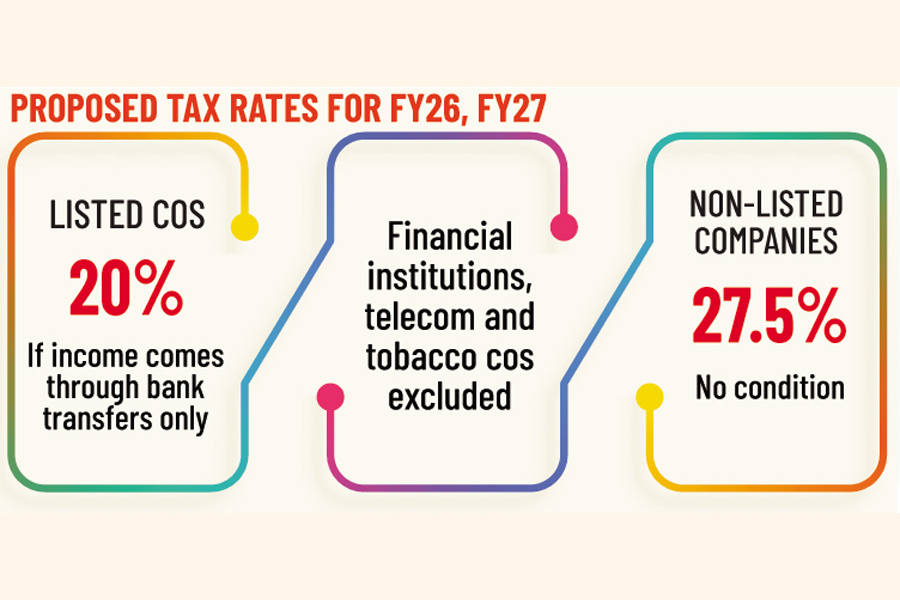
Published :
Updated :

Listed companies may get a tax rebate by 2.5 percentage points to 20 per cent for FY26 and FY27 if income from all sources is transacted through banks, according to the budget laid out on Monday.
The conditions for the rebate have been relaxed this time in the sense that the rebate was earlier subject to digital footprints against every single transaction exceeding Tk 0.5 million and annual expenses and investments exceeding Tk 3.6 million.
So, the companies, which floated shares to the public, may feel encouraged to attain the tax waiver since it does not entail a significant shift from how they have been operating in the not-so-digital economy. At the same time, the easily-attainable incentive may help make progress towards the country's goal of becoming a fully digital economy.
"Instead of requiring all income, expenses, and investments to be transacted via bank transfer, now only income must be transacted through bank transfer to qualify for the reduced rate," said the finance adviser in his budget speech.
That said, gradual transformation is always a more realistic approach than overnight transformation.
If the government's bait for the rebate is taken, listed companies will enjoy a tax advantage by 7.5 percentage points since tax for non-listed peers is fixed at 27.5 per cent with no condition attached for FY26 and FY27.
Hence, the tax gap may be considered to have been widened to 7.5 per cent for the next two fiscal years from 5 per cent for FY25. The gap may lure new domestic and multinational companies into floating shares to the public and listing in the secondary market, which is needed so direly given the prolonged bearish spell in the equity market.
Market operators demanded a minimum tax rate gap of 10 percentage points but they deem 7.5 percentage points as a "good start". It will signify as a retreat from the previous trend of narrowing the gap to utter frustration of the market stakeholders. The tax rate gap had gradually been reduced to 5 percentage points in FY25 from 10 percentage points in FY20, discouraging companies to go public.
The market bears the consequences as the IPO flow has dried up.
"The tax gap could be higher. The gap is expected to go up gradually as we see a starting point," said Ms Mazeda Khatun, president of the Bangladesh Merchant Bankers Association (BMBA).
The move will have an impact for a longer period as it is prescribed for two consecutive years -- not one year, which is the usual practice. This may be an attempt to ensure policy consistency.
"The tax gap has been widened to promote a sector, not any individuals. So, it's expected that the gap would remain unchanged," said Sumit Podder, managing director of MTB Capital, while speaking on whether the next elected government will discard the tax policy.
The recommended tax for listed banks, insurers and other financial institutions is, however, 37.5 per cent, while it is 40 per cent for their non-listed peers. In that case, the gap shrinks to only 2.5 percentage points.
That is not a matter of concern as, Mr Podder said, banks have a binding requirement to go public within three years after receiving a licence.
While non-bank financial institutions (NBFIs) do not have an obligation to list, insurers have to issue primary shares eventually after the launch of their operations.
The budget for FY26 has also proposed cutting the source tax on share transactions to 0.03 per cent from the existing 0.05 per cent. That will bring relief to brokerage firms which are struggling to survive.
Merchant banks that work as issue managers have also been suffering from operating losses, and so a proposed tax cut by 10 percentage points in corporate tax to 27.5 per cent for them would be comforting.
The government seems to have paid heed to the argument that merchant banks do not function as traditional banks and so they should not be punished with a tax rate as high as for banks.
Against the backdrop of the positive moves, Mr Poddar pointed out that the market operators are yet to be clear about the solution to the problem of double taxation and if there will be any reduction in tax on dividend income.
"These are also very important to support the capital market," he said.
mufazzal.fe@gmail.com


 For all latest news, follow The Financial Express Google News channel.
For all latest news, follow The Financial Express Google News channel.